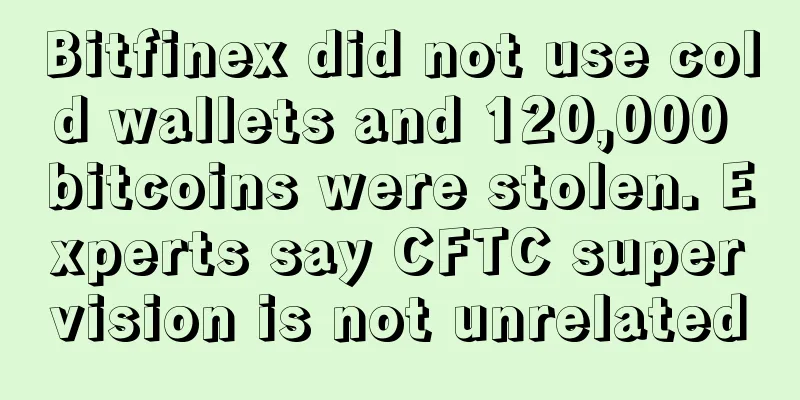Bitfinex did not use cold wallets and 120,000 bitcoins were stolen. Experts say CFTC supervision is not unrelated

|
The theft of nearly 120,000 bitcoins from the Bitfinex exchange has caused a lot of discussion, with some prominent experts saying that the regulatory framework proposed by the CFTC may have hindered Bitfinex's use of cold storage and was one of the important factors leading to this tragedy. On June 2, Bitfinex was investigated by the U.S. Commodity Futures Trading Commission (CFTC) for allegedly violating the Commodity Exchange Act by failing to register as a futures broker and was fined $75,000. The CFTC stated at the time: " The Bitfinex platform allows users to borrow funds from other users and conduct leveraged and margin trading. In addition, Bitfinex did not actually hand over these bitcoins to traders. Instead, Bitfinex stored these bitcoins in wallets under its own control ," which violated the CFTC's commodity trading regulatory rules and forced Bitfinex to abandon cold storage. It is precisely because of the regulatory framework proposed by the CFTC that Bitfinex (and other exchanges) are unable to store users’ coins offline (cold wallets). This may also be the only factor that led to this security breach and the loss of nearly $65 million in Bitcoin. Is KYC/AML regulation justified?In the United States, the enforcement of Know Your Customer (KYC) and Anti-Money Laundering (AML) regulations is very strict, especially for companies that handle money transfers. Large companies like Bitfinex are required by law to record user data and store sensitive personal and financial information on their private servers. On the Bitfinex exchange, users need to verify a series of documents and identification, such as passports and bank information, which are kept by the Bitfinex exchange. If regulators such as the CFTC require it, the Bitfinex exchange needs to provide them with this information. Bitcoin expert Andreas Antonopoulos speculated that it was KYC and AML regulations that prevented the exchange from using cold storage.
There is no doubt that this Bitfinex incident once again reminds us of the importance of using cold wallets. |
Recommend
How to tell if you have good fortune in your face
In today's society, everyone is working hard ...
What does a mole on the double eyelid mean? Is it good for a woman to have a mole under the upper eyelid?
Eyes are the windows to the soul. If there are mo...
The appearance of peach blossoms leads to career failure
The appearance of peach blossoms leads to career ...
Controversy: I paid for the electricity and bought the equipment myself, so why do you say Bitcoin mining is a waste of resources?
Blockchain is still very popular, as can be seen ...
How to analyze a woman’s destiny from her palms?
Palmistry has been passed down from ancient times...
What kind of face shows that a person is unfaithful and unfilial
As the saying goes, it has always been difficult ...
What does a man with a high nose represent?
If a man has a high nose, what kind of fate does ...
Don't ruin your luck with plastic surgery
Everyone loves beauty. It is true that people now...
Colorful Research Institute YSL.IO - Maximizing the Return of Crypto Assets in DeFi
At 20:00 on July 14, Qicai Research Institute and...
Delaware wants to put company share registration on blockchain
Rage Comment : Delaware wants to determine the le...
What is Nian Shang and Shou Shang? What numerological information does Nian Shang and Shou Shang contain?
Nianshang and Shoushang are below the bridge of t...
People who want to cry when arguing with others have thick noses.
Quarreling is something that everyone will experi...
Big nose face
Big nose face In physiognomy, the tip of the nose...
What are the female stars who have the appearance of a husband-killer?
If a woman has a face that will bring bad luck to...
Is it good for a man to have a flat nose?
Is it good for a man to have a flat nose? It goes...









